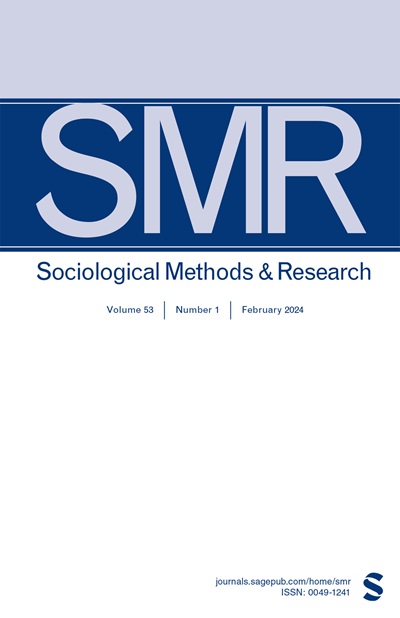社会与生命历程研究中纵向与事件时间数据的联合模型:就业状况与退休时间
IF 6.5
2区 社会学
Q1 SOCIAL SCIENCES, MATHEMATICAL METHODS
引用次数: 0
摘要
纵向研究包括社会研究中的事件发生时间结果,通常使用事件历史分析的形式来分析时变内生协变量对事件发生时间结果的影响。然而,许多标准的事件历史模型假设感兴趣的协变量是外生的,并且包含内生协变量可能导致偏差。虽然这种偏差可以通过使用纵向和事件时间结果的联合模型来处理,但这些类型的模型在社会研究中未得到充分利用。为了填补社会科学建模工具包中的这一空白,我们引入了一种新的贝叶斯联合模型,其中多项纵向结果与事件时间结果同时建模。该模型在方法上的新颖之处在于,它涉及一个包含多项纵向结果的相关随机效应关联结构。我们展示了丹麦劳动力市场数据联合模型的使用,并将联合模型与标准事件历史模型进行了比较。与标准的生存模式相比,联合模式有三个优势。它减少了偏差,使我们能够探索外生协变量与纵向结果之间的关系,并且可以灵活地扩展为多个时间到事件和纵向结果。本文章由计算机程序翻译,如有差异,请以英文原文为准。
A Joint Model for Longitudinal and Time-to-event Data in Social and Life Course Research: Employment Status and Time to Retirement
Longitudinal studies including a time-to-event outcome in social research often use a form of event history analysis to analyse the influence of time-varying endogenous covariates on the time-to-event outcome. Many standard event history models however assume the covariates of interest to be exogenous and inclusion of an endogenous covariate may lead to bias. Although such bias can be dealt with by using joint models for longitudinal and time-to-event outcomes, these types of models are underused in social research. In order to fill this gap in the social science modelling toolkit, we introduce a novel Bayesian joint model in which a multinomial longitudinal outcome is modelled simultaneously with a time-to-event outcome. The methodological novelty of this model is that it concerns a correlated random effects association structure that includes a multinomial longitudinal outcome. We show the use of the joint model on Danish labour market data and compare the joint model to a standard event history model. The joint model has three advantages over a standard survival model. It decreases bias, allows us to explore the relation between exogenous covariates and the longitudinal outcome and can be flexibly extended with multiple time-to-event and longitudinal outcomes.
求助全文
通过发布文献求助,成功后即可免费获取论文全文。
去求助
来源期刊

Sociological Methods & Research
Multiple-
CiteScore
16.30
自引率
3.20%
发文量
40
期刊介绍:
Sociological Methods & Research is a quarterly journal devoted to sociology as a cumulative empirical science. The objectives of SMR are multiple, but emphasis is placed on articles that advance the understanding of the field through systematic presentations that clarify methodological problems and assist in ordering the known facts in an area. Review articles will be published, particularly those that emphasize a critical analysis of the status of the arts, but original presentations that are broadly based and provide new research will also be published. Intrinsically, SMR is viewed as substantive journal but one that is highly focused on the assessment of the scientific status of sociology. The scope is broad and flexible, and authors are invited to correspond with the editors about the appropriateness of their articles.
 求助内容:
求助内容: 应助结果提醒方式:
应助结果提醒方式:


